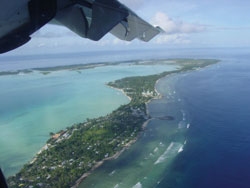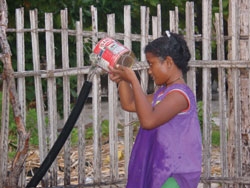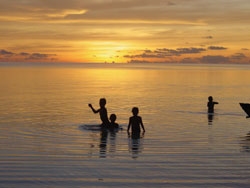Pacific Dialogue on Water and Climate - Dr Marc Overmars, SOPAC
Island Vulnerability

The vulnerability of Small Island Countries has received increasing attention since the Barbados Conference on the Sustainable Development of Small Island Developing States in 1994.
The particular vulnerability of islands is often described in terms of their remoteness, small size and exposure to climatic instability. The significance of the climatic component of vulnerability has drawn particular attention to the impacts of climate variability and change on Pacific Island Countries (PICs).
Climatic events in the region, such as El Niño Southern Oscillation (ENSO) episodes; the reverse condition to El Niño, La Niña; and tropical cyclones causing either droughts or floods, have a large impact on the water resources of PICs.
In addition to current climatic variability, there is the possibility of climate change and sea level rise caused by the enhanced greenhouse effect resulting from worldwide emissions of greenhouse gases. Climate change scenarios for PICs vary according to location and the models used. Most models predict an increase in frequency of El Niño episodes and increased intensity of cyclones.
Pacific Dialogue on Water and Climate

The vulnerability of Small Island Countries was also acknowledged by the global water community through the inclusion of "Water in Small Island Countries" as a special theme at the 3rd World Water Forum that was held in Kyoto, Japan from 16-23 March 2003. The South Pacific Applied Geoscience Commission (SOPAC) and the Asian Development Bank (ADB) jointly led this "Water in Small Island Countries" session. 1
As part of the Pacific preparations for the 3rd World Water Forum, a regional consultation on sustainable water management was held in conjunction with the "Pacific Dialogue on Water and Climate". This dialogue was initiated "to improve the capacity in water resources management to cope with the impacts of increasing variability of the world’s climate, by establishing a platform through which policymakers and water resources managers have better access to, and make better use of, information generated by climatologists and meteorologists."2
Outcomes
As a result of the regional consultation Ministers, Heads of Delegation and representatives of civil society groups with responsibilities for water affairs from 16 small island countries in the Pacific, as well as East Timor and the Maldives agreed upon the implementation of the "Pacific Regional Action Plan for Sustainable Water Management" Relevant to the Dialogue on Water and Climate, the regional action plan contained three key messages as follows:
- Key Message 1: Strengthen the capacity of small island countries to conduct water resources assessment and monitoring as a key component of sustainable water resources management.
- Key Message 2: There is a need for capacity development to enhance the application of climate information to cope with climate variability and change.
- Key Message 3: Change the paradigm for dealing with Island Vulnerability from disaster response to hazard assessment and risk management, particularly in Integrated Water Resource Management.
From Vision to Action

Based on the Key Messages the need for regular climate information and hydrological training have been identified by the New Zealand Agency for International Aid (NZAID) as two needs for Pacific Island countries that can be addressed through their assistance to the Pacific Type II Partnership Initiative on Sustainable Water Management.
NZAID agreed to the funding of a programme to provide monthly climate information through the Pacific Island Climate Update (ICU) and develop and strengthen the basic hydrological training needs of small island countries in the Pacific.
The publication of the ICU has been continued and plans are being developed to broaden its scope to include additional information for end users in Pacific islands, such as the effects of forecast climate on an island’s water resources (rainfall, surface and ground waters).
A wider distribution of the ICU will enhance the application of climate information by climate sensitive sectors such as energy, water supply, agriculture, etc. As a result of SOPAC’s involvement, the ICU will be disseminated to a wider group of end-users in the Pacific, including national hydrological services, water utility managers and disaster managers.
1http://list.sopac.org.fj/Secretariat/Programmes/H2O/3rd_world_water_ forum/index.html 2http://www.waterandclimate.org/home.html
For further information, please contact Dr Marc Overmars at SOPAC, e-mail [email protected]
